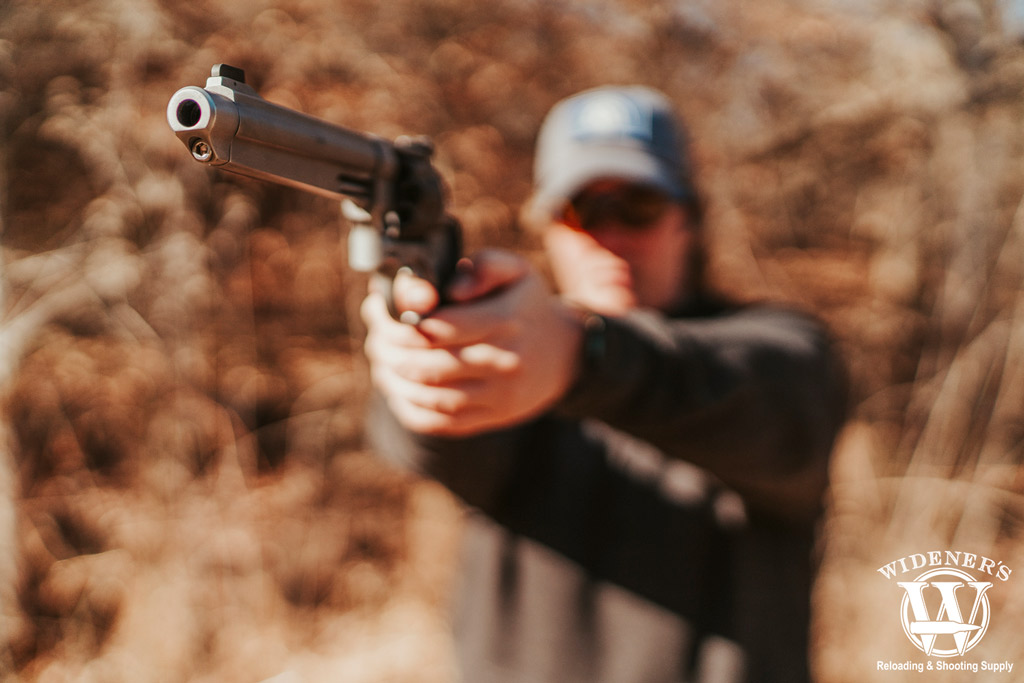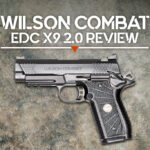
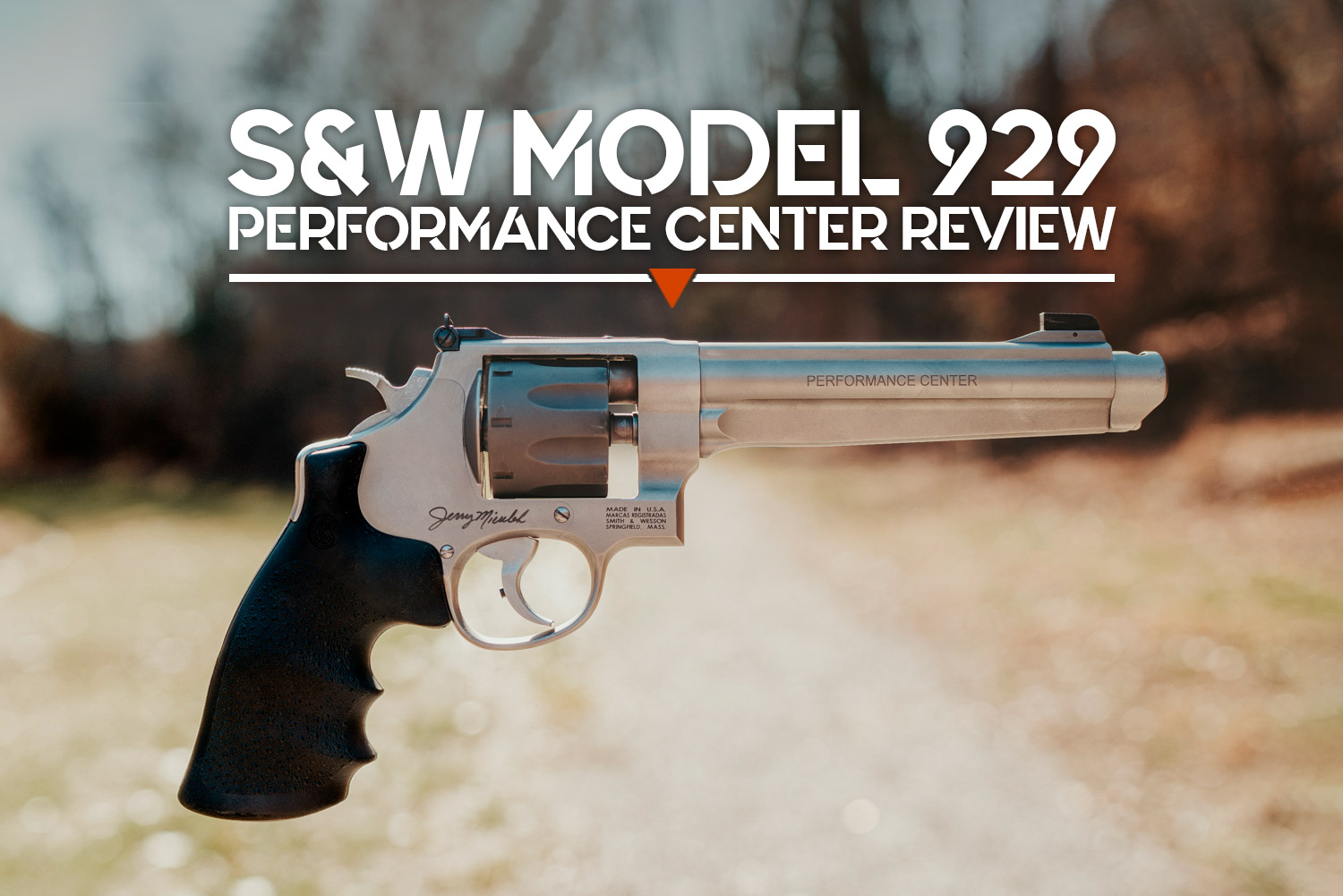
Guest Writer: Kenzie Fitzpatrick
The Smith & Wesson 929 is not your grandfather’s revolver. It’s a different kind of beast that has the fit, finish, and attention to detail you’d expect from a Smith & Wesson Performance Center model. It comes equipped with a custom-tuned action, a removable compensator, and two extra rounds compared to the average six-shooter. In this review, I’ll discuss who this gun is for, address the pros and cons of owning a revolver, and give my opinion on whether this signature model lives up to the legend of its namesake, Jerry Miculek.
The practical use for this pistol is in the world of competitive shooting. The United States Practical Shooting Association (USPSA) and the Steel Challenge Shooting Association (SCSA) still have a revolver division in which shooters can compete. There aren’t many revolver shooters left, but they are keeping the nostalgia alive. To compete with a revolver, you need a unique holster designed to “race” and moon clip holders that look similar to a peg board design. And, of course, all the moon clips you can carry on your belt.
If this revolver is on your radar, you’ve likely got some questions about its performance and how it handles. I’ll cover all of that and more in the Smith & Wesson 929 review below:
Notable Features: Smith & Wesson 929
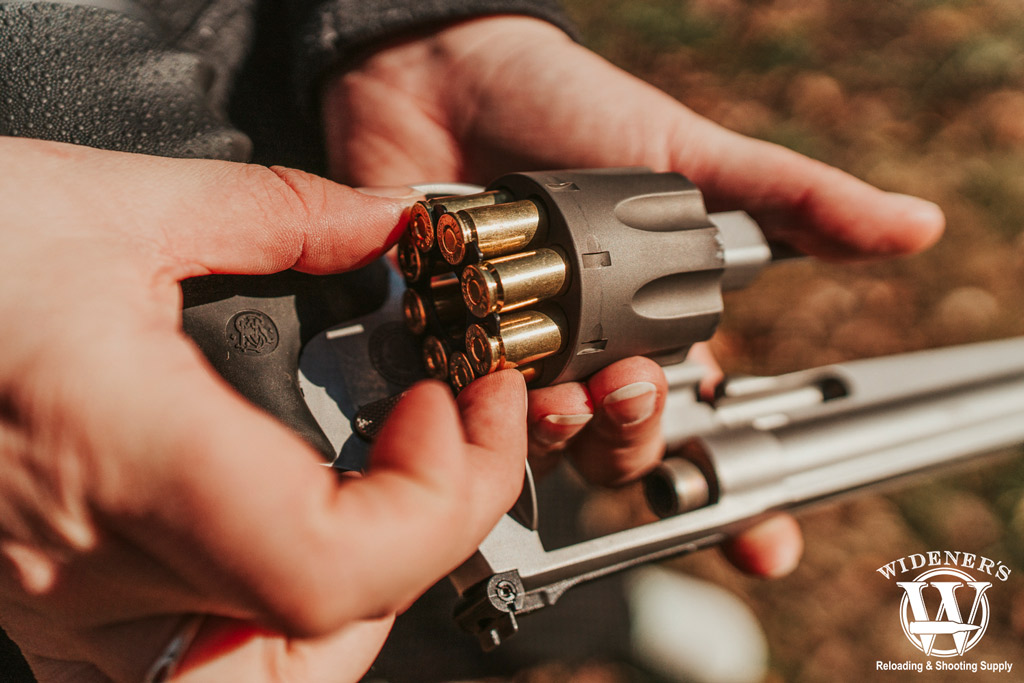
The quality of the Smith & Wesson 929 is excellent, the tuned action is smooth, and the compensator easily handles the 9mm recoil.
Specifications
- Size: Width: 1.7 in, Length: 12.3 in, Height: 6.1 in
- Barrel Length: 6.5”
- Weight: 44.1 oz
- Caliber: 9mm
- Capacity: 8
- Action: Single/Double
- Grip: Synthetic
- Sights: Patridge
- Optic Ready: No
- Barrel Material: Stainless Steel
- Frame: Stainless Steel
- Trigger: 10lb
- Removable Compensator
- Titanium Cylinder
- Jerry Miculek Signature
- Chrome Teardrop Hammer
- ChromeTrigger with Stop
- Cylinder Cut for Moonclips (Includes Moon Clips)
- PC-Tuned Action
Removeable Compensator
Like compensators on semi-automatic pistols, a compensator on a revolver can mitigate some felt recoil and direct the gases upward, resulting in less muzzle rise. This makes a difference based on the ammunition you choose to shoot. In the world of USPSA and SCSA, most competitors reload their own ammunition specific to their firearm of choice.
Reloaders might not need the compensator as much with lighter loads, but someone shooting fast factory ammunition may need it. The best way to test the compensator is to try 115, 124, and 147-grain ammunition with and without the compensator to see what feels best to you when firing the gun.
Performance Center Tuned Action
With any double-action revolver, there’s a noticeable difference in pulling the trigger in double-action mode vs. single-action mode. Of course, single-action has a shorter pull and is much easier to reach and fire. Smith & Wesson advertises a PC-tuned action with the 929 model revolver. This shows the most difference in the double-action mode. Most competition shooters will still make aftermarket modifications to make shooting it faster (more on that below), but this tuned action is helpful for the average competitor.
Compatibility
Holsters
The most problematic part of shooting a gun that hardly anyone uses anymore is finding aftermarket support for it. Without USPSA and SCSA competitors wanting to shoot in the revolver division, there might not have been many holster options. Guga Ribas makes a Universal Holster for revolvers that includes a support rod for the revolver’s muzzle. It’s ambidextrous and adjustable for height and angles to customize your draw.
CR Speed also makes the Speed Holster WSM-II for revolvers, but to fit the 929, you’ll also need to purchase the muzzle support, revolver adapter, and extension rod bundle. Comp-Tac makes a 6.5-inch barrel N Frame revolver holster, but it’s harder to find. Finally, there is the Speed Beez Best Kydex Tactical Revolver holster, and Speed Beez does a lot for shooting sports, giving back to matches by sponsoring them and donating prize table items. Speed Beez is also the place to shop for moon clip belts and more.
Moon Clips
Moon Clips are a necessity, and in the world of revolvers, more is better. I’ve learned that moon clips can be finicky and must be constantly inspected and tested. The main issues I learned from revolver competitors are losing moon clips at matches, dropping them to reload, and fellow squadmates accidentally stepping on them. Moon clips are fairly durable, as they must be, but having more is the key to successfully making it through an entire match.
Moon clips come in different thicknesses and different materials. TK Custom, for example, sells OEM moon clips but also makes .035-0.040 moon clips machined from stainless steel and blue steel. I highly recommend getting an unloading and loading tool because once you start messing with moon clips, your fingers will be wrecked.
Moon Clip Holders
At the 2022 Nationals event, I first saw a belt with moon clip holders. I had never considered revolver holsters, moon clips, or a belt to hold it all until that match. One avid revolver competitor told me he built his own belt out of necessity when he started because no one was making them.
Speed Beez has an eight-post moon clip belt rack. Double Alpha is also known for supporting shooting sports and makes a magnetic eight-shot moon clip holder. Midwest Competition Works makes a Revolution Rack moon clip holder as well. There are probably others I missed, but even a quick Google search doesn’t bring up very many options.
Pros: Smith & Wesson 929
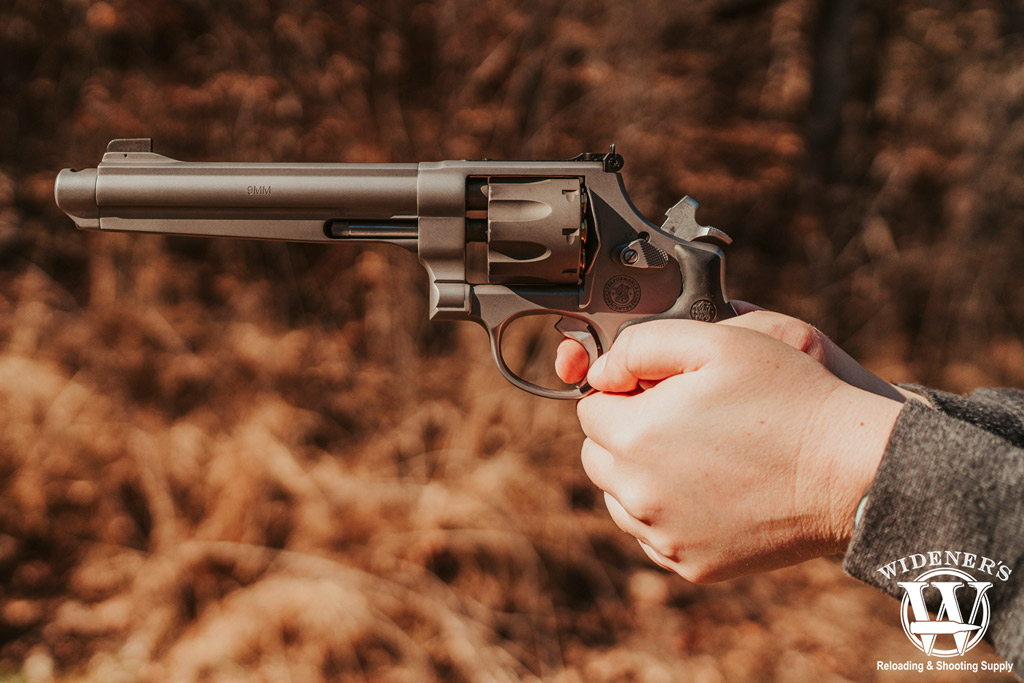
Ringing Steel: Speed and accuracy on the range is not an issue with the Smith & Wesson 929.
Aftermarket Support
Despite the Smith & Wesson 929 not being as popular to shoot in competition, there is plenty of aftermarket support for it if it’s something you want to shoot. One of the best parts about a revolver is how easy it is to swap grips out to find one that fits your hand size better or in a better texture. There is aftermarket support for rubber grips, finger or no-finger grooves, a round butt or big butt grip, G10, and so much more.
Smith & Wesson Lifetime Service Policy
You can’t go wrong with Smith & Wesson when looking for a reliable and accurate gun. They’ve also been around forever and have an excellent reputation for customer service. Take advantage of their lifetime service policy if you purchase a gun from them.
Accurate & Easy To Shoot
Revolvers are not my strong suit, and I don’t know many people who enjoy shooting double-action. Even though I knew it was built for competition, the 929 was easier to shoot than I thought it would be. My finger could easily reach the trigger, and I could shoot in double-action mode with no problem. But what surprised me most was the felt recoil. With and without the compensator, it’s a pleasant gun to shoot that doesn’t have a lot of muzzle rise.
You’d expect that with a longer barrel and the compensator, but I still had to experience it to believe it. The gun is super accurate. I remember watching the pros shoot partial targets, swingers, and clamshell targets at 20-30 yards and being amazed at how easy they made it look to score Alphas.
Cons: Smith & Wesson 929
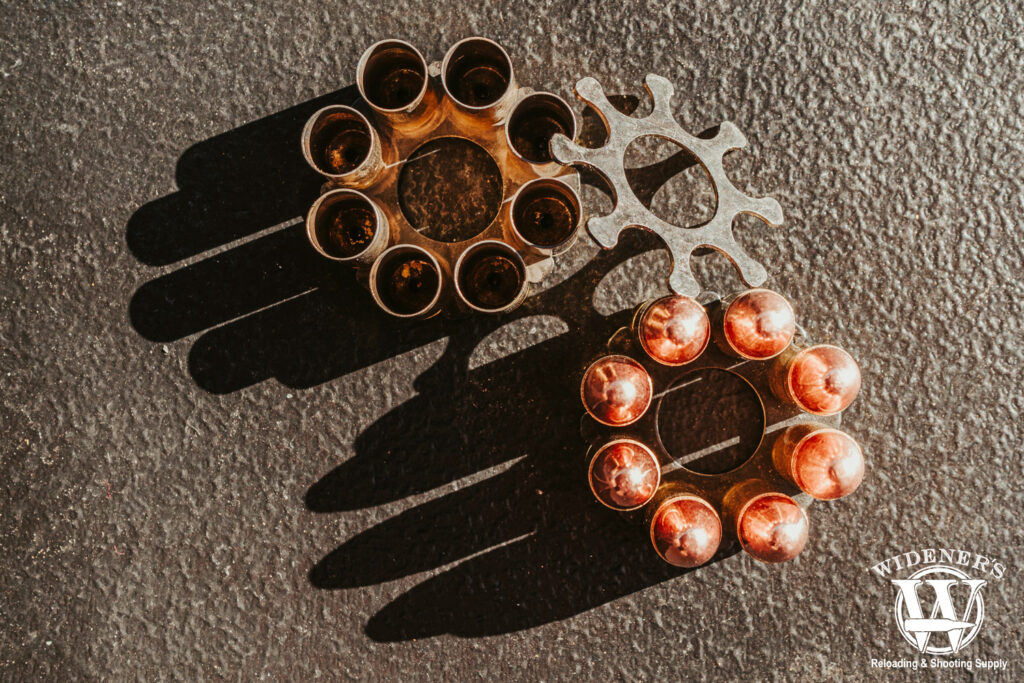
Ammo Selection: Not every 9mm round is suited for this revolver, stick to name-brand ammo with proven consistency.
Ammunition Selection
One of the challenges I faced with this pistol was finding the perfect ammunition to work with it. Every firearm will have a specific ammo that cycles better or shoots more accurately. However, I found the Smith & Wesson 929 was slightly picky in what ammo it would consistently run. If the ammo you are using is mass-produced, be sure to check the consistency of the bullet seating. I found cartridges that were inconsistent in their seating depth, to also be inconsistent in cycling when shooting this revolver.
The issue I experienced could also be related to using the provided factory moon clips. They are notorious for getting bent, or being out of spec due to heavy use. However, keep in mind that this is a precision-made handgun. If you want to get the most out of it, you’re going to want to use the good stuff with it. Cheap ammo is fun for plinking, but will not deliver the level of performance needed to get the most out of this gun. What I would recommend is loading your own ammo or doing your own ballistic testing to find the perfect ammo to run in this revolver.
Additional Customization Needed?
I can’t imagine attending a shooting competition and being the sole competitor in a specific division. It is so helpful to shoot with other people competing in your same division so you can share ideas on how to shoot a stage or share gear. That being said, after asking around most of the competitors I talked to advocated for additional customization of the Smith & Wesson 929 for competition use. The number one thing I heard from competitors was that the factory trigger needed to be lightened in pull weight and smoothed out.
Another issue that was brought to my attention was the chamfering of the titanium cylinder. Smith & Wesson does chamfer the extractor, but not the individual chambers of the cylinder. You can request this service for a fee, by sending your gun into the Performance Center. It’s not easy to compete with a revolver against high-capacity race pistols. So having your competition revolver as finely tuned as possible is a must if you plan to compete with it.
Depending on your level of skill, and commitment, additional customization of the Smith & Wesson 929 may be required for the gun to meet your expectations. If you don’t care about these things, I say get out there and have fun shooting in the revolver division!
Price VS Value
Getting into shooting sports is an investment. Many other divisions cost a lot less to get started in than revolver. A stock Glock, any competition or sturdy belt, holster, two to three mag pouches, and three magazines will get you off to the races in most shooting competitions. With the revolver division, you need the gun, moon clips, a specific holster (priced higher than mass-produced firearm holsters), and a specific belt with moon clip holders, which is also more expensive.
The Smith & Wesson 929 retails for $1,469.00, and that’s not within everyone’s budget. Because it’s one of the very few options with out of the box professional-level craftsmanship that is fun and competitive to shoot with, it’s priced as such. It’s a race-ready revolver, designed with competitors in mind. You don’t have to spend as much on aftermarket support as you would with semi-automatic pistols or other revolvers to get it competition-ready.
Smith & Wesson 929: Who’s It For?
One of my personal favorite range memories was shooting the 2022 USPSA Classic Nationals match and watching the revolver shooters compete. I was fortunate to shoot with a revolver competitor on my squad who was using the Jerry Miculek Smith & Wesson 929. I watched closely how he reloaded the gun on the move and under time pressure. It was one of the most complex skills I’ve ever seen someone perform in a competition.
When I wasn’t competing, I watched national and world champion revolver shooter Michael Poggie annihilate stage after stage. He won the Revolver National Champion title that year. If you want to see some neat first-person footage of him shooting an Open Division 929 revolver, check out his YouTube.
There aren’t many options for a competition-ready revolver or one that is adjustable to fit your needs and division. The Smith & Wesson 929 is arguably the best, used by the best. While I didn’t spend the money getting an entire competition rig or trying to compete with the revolver, I did spend some time on the range with it. As with any firearm, there are pros and cons to it.
That being said, this is a seriously fun gun to shoot. It’s not every day I get to play with a revolver, especially not a signature Jerry Miculek Performance Center revolver. I would love to one day take this pistol for a test drive at a match. I can only imagine how challenging, yet rewarding it would be to shoot in a competition. Bottom line. Don’t be intimidated by this pistol’s barrel length or its size. Believe me when I say it’s easy to shoot and with a little fine-tuning, its performance lives up to its legendary namesake.


